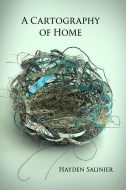 Hayden Saunier
Hayden Saunier
A Cartography of Home
Terrapin Books
Reviewer: Lee Rossi
Hayden Saunier is one of those poet farmers who are distinctive in our culture for their scarcity. We remember Frost. We may know Donald Hall and Wendell Berry. We may even recall Horace, with an estate gifted by his patron Maecenas and worked by slaves. I’m not sure about Virgil, who had a lot to say about agriculture, and less so about Hesiod, who was a compendium of ancient farm lore and practice. I suppose that back then you either grew food or starved.
Saunier’s “second crop” is theatre, and for the past dozen years, she’s been bringing in a third, poetry. A Cartography of Home, her fourth full-length collection, demonstrates a variety of poetic skills: the ability to project a mood or feeling, sensitivity to the natural world, and a gift for satire, glancing askance at the hurry-hurry of modern life.
Hers is an imagination inflected with disaster. Just because she lives on a farm doesn’t mean she’s at peace with modern agriculture. In “I’m Also the Fox” we see her standing at her kitchen sink complaining about the “over-fed under-ripened strawberries” she prepares for breakfast. They never had a chance, she tells us, to ripen into delicious fruit, “because we are divided / from our food in the way we are divided from / each other and divided from ourselves.”
Yet if humanity, with its greed and inattention, is a problem, nature itself is problematic. Even trees must struggle to survive: “hickories and pin oaks … shoulder each other for sky.”
Living close to the land is not always a comfort. In “Speech,” for instance, we witness her “step barefooted / on the small hard skull of a bodiless // mouse,” a present from her cats. “Every night,” she tells us,
I curl up with killers, every day
I walk over the dead, and no, I can’t
count the layers of the once-living
stacked beneath me.
Somber? Yes, but also the occasion for chilly humor. She notes that every time she steps on some small dead thing, it “delivers the same / brief, motivational speech directly // to my spine.”
Hers is a fallen world. We see in “Forecast” how she deploys Christian symbols for Darwinian purposes. Like Dickinson before her she meets a “narrow fellow in the grass”:
Something swift
and slender crosses the path.
Let’s pretend
it’s only animal, not sign.
Usually the farm and the nature it inhabits are grist enough for Saunier’s philosophical mills, but occasionally she will focus on the larger world. “After the Press Conference” offers us a meditation on dirt, the metaphysical kind, the kind one finds hiding within political rhetoric:
Truth is we know when someone’s lying.
Truth is we know when we pretend we don’t know
someone’s lying, when we let the lie go, take the money.
For Saunier, plainspokenness—telling it like it is—is an important value, both morally and poetically, a strategy that reminds us of Frost, among others.
Of course, Saunier’s moralistic bent is most intensely focused on herself. In “Liminal,” for instance, she observes that:
… there’s no telling
what’s inside,
what’s out.
Only most mornings it’s there.
Everything you knew
before you knew anything.
What do we know? How do we know it? Those are hard enough questions, made all the harder by our gift for self-deception. In “Locks,” for instance, she tells us that in order to unlock the truth we must act self-deceptively:
as though we were not the lock,
the latch, the lid, the door, not the rue,
not the sorrow, not the ghost with the key.
I’m especially drawn to these lines. So much human misery and conflict result from our unwillingness to examine the ways in which we contribute to our own misery; we are self-conflicted, self-inflicted, fighting ghosts, our past and future selves.
Amid all this dire but truthful self-examination, a poem like “Ode to Customer Support” offers a compelling counterpoint. We’ve all had disappointing experiences with what corporations like to call “Customer Support.” Saunier’s poem, however, expresses genuine gratitude. Even the most technological / bureaucratized context, she tells us, offers the opportunity for human kindness. She recounts, for instance, how once in her darkest hour, a customer support rep “told me not to worry, / told me we will work this out” and then: “miraculously / adjusted my bill.” How wonderful is that? And the language celebrating such kindness is wonderful as well:
Oh, voice of Cedar Rapids,
Bangalore, Toronto, Baton Rouge!
I wish you quiet nights and raucous
bone-deep horn solos, ecstatic
morning glories tumbling from
your garden pots, great sex, great food,
long friendship, and a human voice
answering your cries for help,
all the days and nights of your time off.
One might wish for more such gushing enthusiasm from this poet, but Saunier is a lyric poet who distrusts lyricism, a point made clear in “Deepening the Course,” where she reflects on the day’s work, “dredg[ing] a ditch to keep / storm water … from washing out the lane.” Suddenly she notices tiny eggs in the water which look like blossoms on the still-bare trees overhead. “But that’s a trick of light on water,” she declares:
How reflection makes mottled rocks
glow gray-gold as a mackerel sky,
makes creek beds shimmer into cloud,
makes every single thing seem both
itself and every other thing at once.
The starry eggs tremble.
Beauty appears, but, as the poet suggests, appearances are often deceiving, an artifact of human wishfulness. One might complain that these poems are not hopeful enough, that they’re too negative, and yet, having finished the book, I felt exhilarated, enlivened, confident in this poet’s observations and insights. She wasn’t trying to jolly me into a happier state; instead, she was inviting me to see the world as it really is. Saunier’s clear-sighted vision of herself and her fellows is perhaps the tonic we need for a healthier world.

